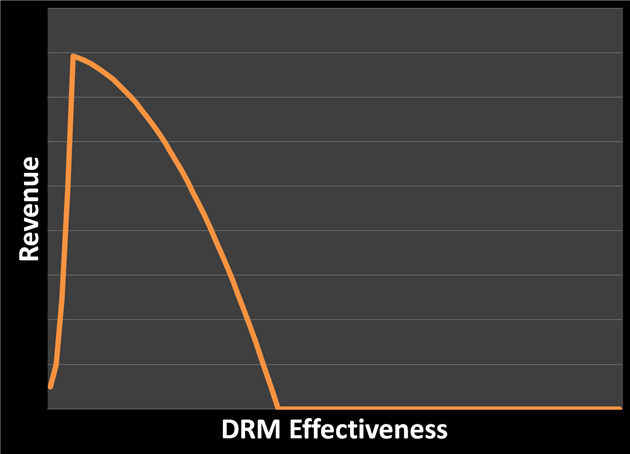The Economics of Digital Rights Management
Cory Doctorow wrote an article criticizing SiDiM in Publishers Weekly last week:
"But the fact that the basis behind this security measure was countered 25 years ago by employing a simple tool that’s getting into its 40s is not the silliest part of this supposed new DRM breakthrough."
This misses the point about how DRM really works.
Most people are fundamentally honest but reading a book or watching a TV show or installing one more copy of a software program doesn't feel like you're doing anything wrong. If you throw up a small roadblock then this is generally enough to gently remind people that they need to cough up.
If I can install another copy of Photoshop from the shared drive to get my job done then I will. If it asks for a license I'm going to ask my boss for one rather than hunting down a cracked copy. DRM works even if it doesn't do very much.
In fact it works best when it doesn't do much. A more sophisticated DRM is more likely to go wrong and is harder to operate. Highly effective DRM starts to hurt you with support and maintenance costs. When it fails to work or to be fair it can backfire spectacularly and cause a consumer backlash.
I spent a lot of time earlier in my career developing and selling DRM and copy protection. Deals were won on security but successful relationships were built from helping publishers balance the technical possibilities with ensuring that legitimate customers had a good experience.
"The idea that copyright owners might convince a judge, or, worse, a jury that because they found a copy of an e-book on the Pirate Bay originally sold to me they can then hold me responsible or civilly liable is almost certainly wrong, as a matter of law."
This doesn't sound right either. We've had enough experience of the record labels and movie studios suing individual copyright infringers, most of whom can't afford to risk a court case even if they have a plausible 'left my laptop unlocked' defense. This wasn't a smart move before, but it doesn't mean that book publishers can't deploy the same flawed strategy.

Related Posts
- More on breaking the Internet
- Licensing Fail: WinZip vs. ScanToPDF
- HBR on the Wrong Patent Reform
- BBC On Patents
- How to fix software patents
(Published to the Fediverse as: The Economics of Digital Rights Management #marketing #drm The utility (or not) of Digital Rights Management has very little to do with the level of security provided. )
Licensing Fail: WinZip vs. ScanToPDF
In general I think the best system is one that helps keep honest users honest. A speed bump that itches the conscience but doesn't get in the way of legitimate customers getting their job done.
I just migrated to a new computer and have finished several days of installing software and drivers. This is never a fun task, but I've been through it a few times and keep all my license information on a NAS drive to reduce the pain.
WinZip has a great trial model. The product is fully functional and nags you just enough that you'll eventually pay. I've been a customer for years, and as I moved to Windows 7 I emailed to ask about upgrade pricing. I got a prompt response and was up and running in no time.
I didn't need to upgrade. The old version of WinZip installed just fine using an existing license key.
ScanToPDF from O Imaging was a different story. The license is locked to a PC, and there's no way to move it automatically. You have to email them. It then gets worse - there's an "administration charge" to move a license. So as a paying customer I have to wait for the UK office to respond to email and even then I can't continue to use the product I've paid for.
I'm sure it's in the small print somewhere.
But the impact is that ScanToPDF has lost a customer, an advocate (I've suggested the product to others in the past, never again) and infuriated me enough to throw up a negative blog post. Is the administration charge really worth it?
At Catfood I use very simple license keys locked just to an email address. I'll refund any purchase with no questions asked. I'll issue new licenses as needed to keep customers happy. I have an online service to retrieve lost keys.
The products get pirated immediately, and finding a key generator doesn't take a lot of sleuthing. I don't care about this at all, because happy customers recommend products to their friends. Pain-free licensing is absolutely key to happy customers. Don't fall into the trap of putting your energy into complicated licensing and enforcing procedures. Add a new feature instead.
Related Posts
- The Economics of Digital Rights Management
- More on breaking the Internet
- Catfood: WebCamSaver and PdfScan
- Installation: Early and Often
- State of the Micro-ISV-osphere
(Published to the Fediverse as: Licensing Fail: WinZip vs. ScanToPDF #marketing #licensing #drm ScanToPDF's painful licensing process makes me mad enough that I ultimately open sourced a free alternative. )